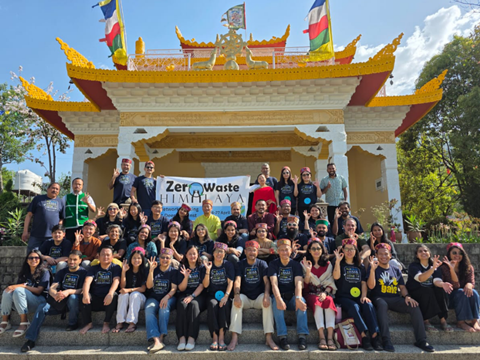
Following the Zero Waste Himalaya Network Meet in April 2025, multiple organisations and NGOs have created the Zero Waste Himalaya Alliance to tackle the reported 80% of plastic waste from single-use food and beverage packaging in the region.
Apparently, 48 participants representing 27 organizations attended this year’s The Himalayan Cleanup event. The Himalayan Cleanup (THC) conducts plastic waste and brand audits to gather data on the main corporate polluters in the region, with this year’s event consisting of a three-day workshop in Himachal Pradesh.
Non-profit organization GAIA-Asia Pacific (Global Alliance for Incinerator Alternatives) and the Break Free From Plastic (BFFP) organisation supported the meeting, where findings from the Himalayan Cleanup Campaign 2024 report were stated. The findings included 80% of waste originating from single-use food and beverage packaging; 70% of collected plastics being non-recyclable with no market value, and current policies failing to address the unique challenges of mountain ecosystems.
The newly formed Zero Waste Himalaya Alliance will continue the annual Himalayan Cleanup campaign while calling for increased resource allocation and urgent attention to be given to how waste intersects with climate, food security, and biodiversity in the region. Participating organisations include Amyaa NGO, Bhutan Ecological Society, Deer Park Institute, HECAF 360 - Nepal, and the Integrated Mountain Initiative.
Last year SIG collaborated with WWF Switzerland and WWF Thailand on a project to protect forest landscapes in Thailand, aligning with its commitment to create, restore, protect, or improve the management of 650,000 hectares of forest by 2030. The initiative aims to enhance forest management and connectivity in the Dawna Tenasserim, Lower Songkhram, and Dong Phayayen landscapes, a total of 60,000 hectares of forests.
It followed the company’s earlier joint project with WWF Malaysia to improve the management of more than 170,000 hectares and pilot the restoration of 25 hectares in Malaysia’s Ulu Muda Forest Complex. The project sought to strengthen the resilience of a landscape in the northern region of Peninsular Malaysia, ensuring water security and enabling economic growth.
If you liked this story, you might also enjoy:
The ultimate guide to the Packaging and Packaging Waste Regulation in 2025
How are the top brands progressing on packaging sustainability?
Everything you need to know about global packaging sustainability regulation in 2025
The key to increasing the use of reusable packaging in supermarkets














No comments yet